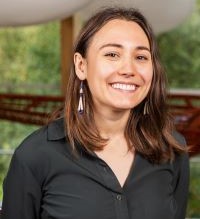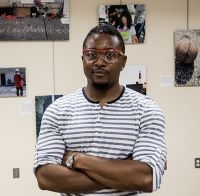Vera S. Paster Award
The Vera Paster Award recognizes a graduate student, post-graduate resident, or fellow in a behavioral health or social justice program who is engaged in work that contributes significantly to the social, education, physical, or psychological well-being of persons of color, thereby promoting their empowerment and ameliorating disadvantage from oppression and its effects.
The Award recognizes the work of Vera S. Paster, Ph.D., president of the American Orthopsychiatric Association from 1986-1987. Vera combined strength with compassion, political effectiveness with personal warmth, and social consciousness with deep interest in the individual. She was effective in bringing people together — unions, boards of education, mental health agencies, civic groups, legislatures, judges, and governors — to work collaboratively to provide basic human needs. Her work as director of the Washington Heights – West Harlem – Inwood Mental Health Center was illustrative of her commitment to engage the community. She designed programs to involve community residents not only in receiving but in giving practical help based on their needs and interests. For example, in order to engage the community in the traditional treatment services of the Mental Health Center, she invited people with various kinds of expertise to come to the Center to share their knowledge. The Mental Health Center became a familiar resource for consumer education, assistance with housing, free legal help and so on. As a result, neighborhood residents were more willing and able to engage in the services offered by the Center. She served on President Jimmy Carter’s Commission on Mental Health, Task Force on Primary Prevention. She also served as Commissioner for Child and Adolescent Services for the Department of Mental Health of the State of Massachusetts.
Dr. Paster was named Psychologist of the Year by the Association of Black Psychologists. In 2001, she was awarded the Lifetime Achievement Award from the Society for the Psychological Study of Ethnic Minority Issues and the Carl Rogers Award from the Society for Humanistic Psychology (American Psychological Association, Division 32).
Award Recipients
2024 | Devi Soman, M.ARCH, PhD Candidate

Devi Soman, M.ARCH, PhD Candidate, is a doctoral candidate in the Planning, Design and Built Environment program with a focus on Architecture + Health at Clemson University.
Ms. Soman was recognized for her work to enhance the well-being of people who have been marginalized by racism.
Devi Soman is a doctoral candidate in the Planning, Design and Built Environment program with a focus on Architecture + Health at Clemson University. She is also a graduate assistant in the Center for Health Facilities Design and Testing. She has a bachelor’s and master’s degree in Architecture from Mumbai University in India and a post-graduate diploma in Hospital and Healthcare Management from Symbiosis International University. Her work focuses on different aspects of healthcare design. Most recently, she has examined diagnostic centers in public healthcare facilities in India. Through her dissertation study, The Impact of Free-Standing Birth Center (FSBC) Environments on Culturally Sensitive Care Experiences and Maternal Health Outcomes for BIPOC women, she explores community birth centers providing midwifery care to BIPOC women. The goal is to understand how the physical environment of the FSBC influences childbirth and culturally sensitive care experiences for birthing women from BIPOC communities and their birthing partners while supporting the staff.
2022 | Jacy Hutchinson, PhD

Jacy Hutchinson, PhD, is a postdoctoral fellow at the Aleutian Pribilof Islands Association.
Dr. Hutchinson was recognized for her dedication in her clinical work to meeting people where they are, understanding the ways in which systems affect their lives, and addressing their needs through creative multi-level interventions aimed not only at treatment, but also prevention and promotion.
Jacy Hutchinson, PhD, was born and raised in Fairbanks, Alaska. She is of mixed heritage, which includes Koyukon Athabascan on her mother’s side and Central European on her father’s. She has experience working in traval health, primary care, private practice, and university mental health. Her research focused on Alaska Native cultural identity development, and internalized oppression and resistance among the Alaska Native population. Through her research, she sought to emphasize the indigenous perspective and highlight the connection between individuals and the larger contexts in which they live. She has been particularly interested in exploring ways that systems can change to support psychological health. Her approach to treatment emphasizes collaboration and empowerment in helping people understand their inner experiences and strengths.
2021 | Trinidad Jackson, PhD, MPH

Trinidad Jackson, PhD, is an assistant professor of Health Promotion and Behavioral Sciences, University of Louisville, and senior advisor to the Commissioner of the Kentucky Department of Community-Based Services
Dr. Jackson was recognized for his efforts to promote work with the community and city government to promote constructive dialogue to address the social inequities and structural racism that led to violence in the community.
Trinidad Jackson, PhD, earned a MS (clinical psych) and an MPH. He spent his early career as a public health practitioner working to prevent and treat malaria in Ghana and to address food insecurity and promote good nutrition in marginalized communities in Nashville. When Michael Brown was shot in St. Louis, Dr. Jackson returned to St. Louis, his hometown, to promote constructive engagement to address the social inequities and structural violence that led to Mr. Brown’s death. He was pivotal in developing the “pride, peace, prevention” violence prevention campaign funded by the Centers for Disease Control. He also was a central voice working with both the community and city government during the protest that erupted in the wake of the Breonna Taylor shooting.
2020 | Annahir Cariello

Annahir Cariello, PhD, is a clinical health psychology resident, Medical College of Wisconsin.
Dr. Cariello was recognized for her pioneering work with the Latino immigrant community, including her efforts to initiate a behavioral medicine service for these patients.
Annahir Cariello, M.Ed., M.S., defended her dissertation April 2020. She is currently a clinical health psychology resident at the Medical College of Wisconsin. She complete her degree in Counseling Psychology at Virginia Commonwealth University studying under the mentorship of Dr. Paul Perrin.
Annahir’s research lies at the intersection of mental and physical health among those in minoritized groups. Specifically, her work investigates the biopsychosocial aspects of chronic illness through neurological, environmental, and psychological functioning as related to trauma and minority stressors. Her work aims at improving adjustment to and prevention of chronic illnesses in minorities and disabilities across generations for the development of culturally sensitive treatments. Annahir’s long-term goal is to become an independent translational minority researcher and clinician investigating the intersection of mental health, minority stressors, and trauma’s impact on neurological and physiological processes in minorities for the development of culturally sensitive treatments.
2019 | Jillian Fish

Jill Fish earned her Ph.D. in Counseling Psychology at the University of Minnesota, Twin Cities, and her training is in developmental and cultural psychology. Jill is a member of the Tuscarora tribe of the Iroquois Confederacy. Her research has focused on transforming social institutions to be more just and equitable for Native American and Indigenous peoples.
In 2017, Jill was invited to work on the Immigrant Stories project at the University of Minnesota. The project examined the process of migration through an interdisciplinary lens. While working on the project, she gained first-hand experience of the emancipatory power of digital storytelling for marginalized communities. Jill subsequently adapted the Immigrant Stories project to use with Native American communities. In 2018, Jill founded OrigiNatives, a digital storytelling project that hosts workshops for Native American and Indigenous peoples to create original digital stories about their culture, histories, and lives.
2018 | Andrew Gadaire

As a Community Psychology Ph.D. student at the University of North Carolina at Charlotte, Drew Gadaire is interested in conducting applied research and evaluation to better understand the experiences of marginalized populations, the systems that influence the developmental trajectories of disadvantaged youth, and the interventions designed to benefit these groups. Furthermore, Drew works with community partners to build capacity and increase the effectiveness of interventions targeting low-income families and historically disempowered populations. For example, Drew has taken on leadership roles in applied projects focused on early childhood education, dropout prevention, community engagement, and in-school supports for recent immigrant youth. Drew’s work seeks to engage stakeholders at multiple levels and empower participants in order to design, implement, and evaluate interventions that facilitate sustainable change.
2017 | Rebecca Singer

Rebecca Singer is a student in the Advanced Population Health Nursing Doctor of Nursing Practice program at the University of Illinois at Chicago. Rebecca came to nursing driven by a keen desire to do global health work and to prove wrong the idea that where you live will determine if you live. Since 2005, Rebecca has worked in humanitarian response work with Doctors Without Borders. She has been instrumental in developing comprehensive and appropriate response services, including mental health, psycho-social and legal services, for survivors of sexual violence in countries including Liberia, Papua New Guinea, Chad, Tanzania, the Democratic Republic of Congo and Zimbabwe.
The common thread throughout Rebecca’s nursing career, which continues with her current training and education, is a commitment to community engagement to create change. She engages directly with patients, community members, health care workers, community leaders, elected officials and other service providers to understand the needs of each community and assist in solving the problems facing the community.
2016 | Sara Buckingham
Sara Buckingham, Ph.D., received the Vera Paster Award for her creativity, initiative, and drive to positively impact the lives of Latina/o individuals, families, and communities and her work in leading a local chapter of RESULTS, which pushes for specific policies and legislation to address poverty and empowers people to become powerful voices for the end of poverty through grassroots advocacy.
2015 | Sannisha Dale
Sannisha Dale, Ph.D., received the Vera Paster Award for her research exploring the relationship of gender-related coping styles, HIV status, trauma history, and health among women.
2014 | Andrew Case
Andrew Case, Ph.D., was recognized for his research on social determinants of health disparities affecting ethnic minority populations and counterspaces. Counterspaces are settings (e.g., faith communities, cultural organizations, peer networks) that promote well-being under socially oppressive conditions such as discrimination.
